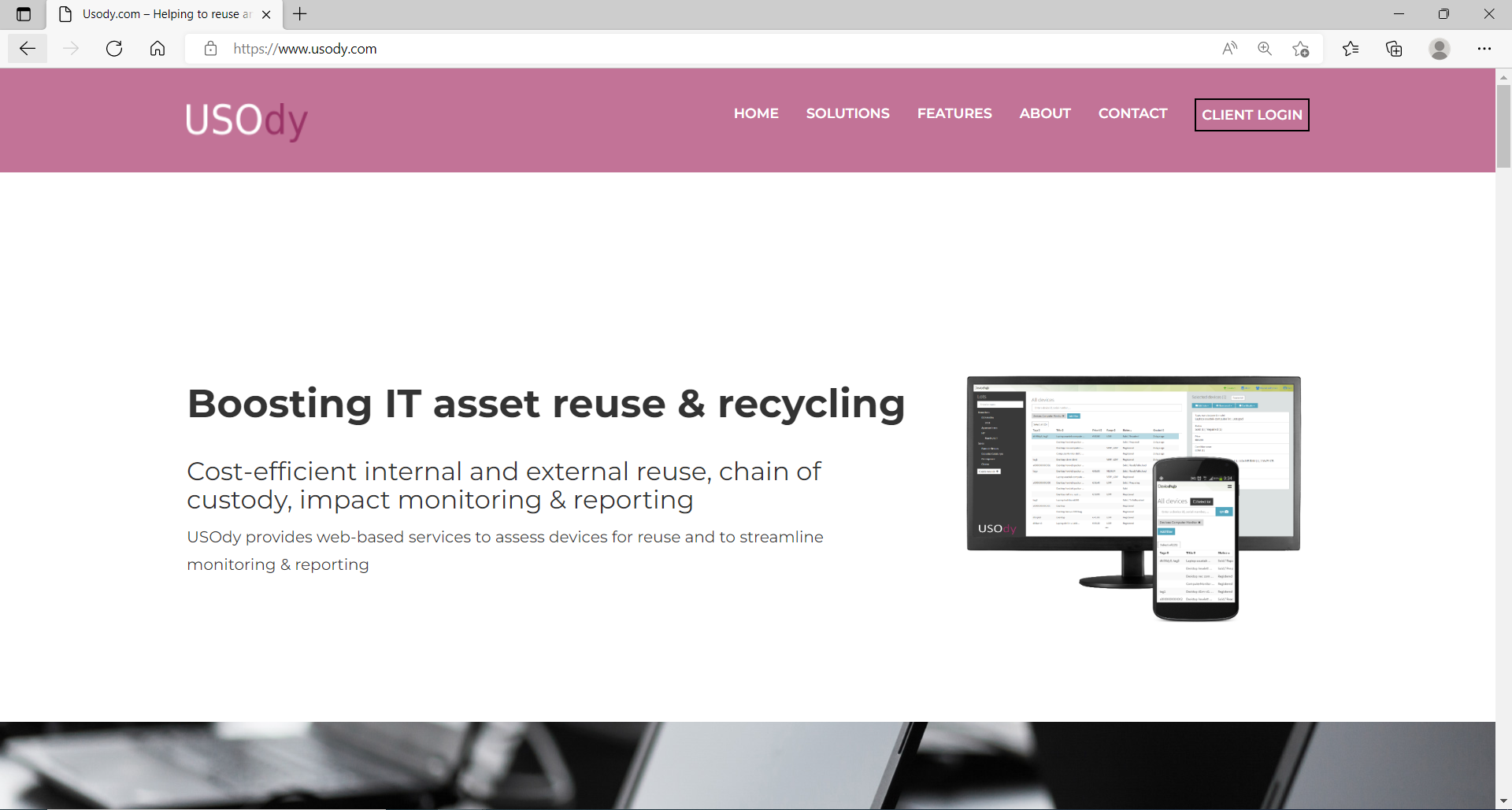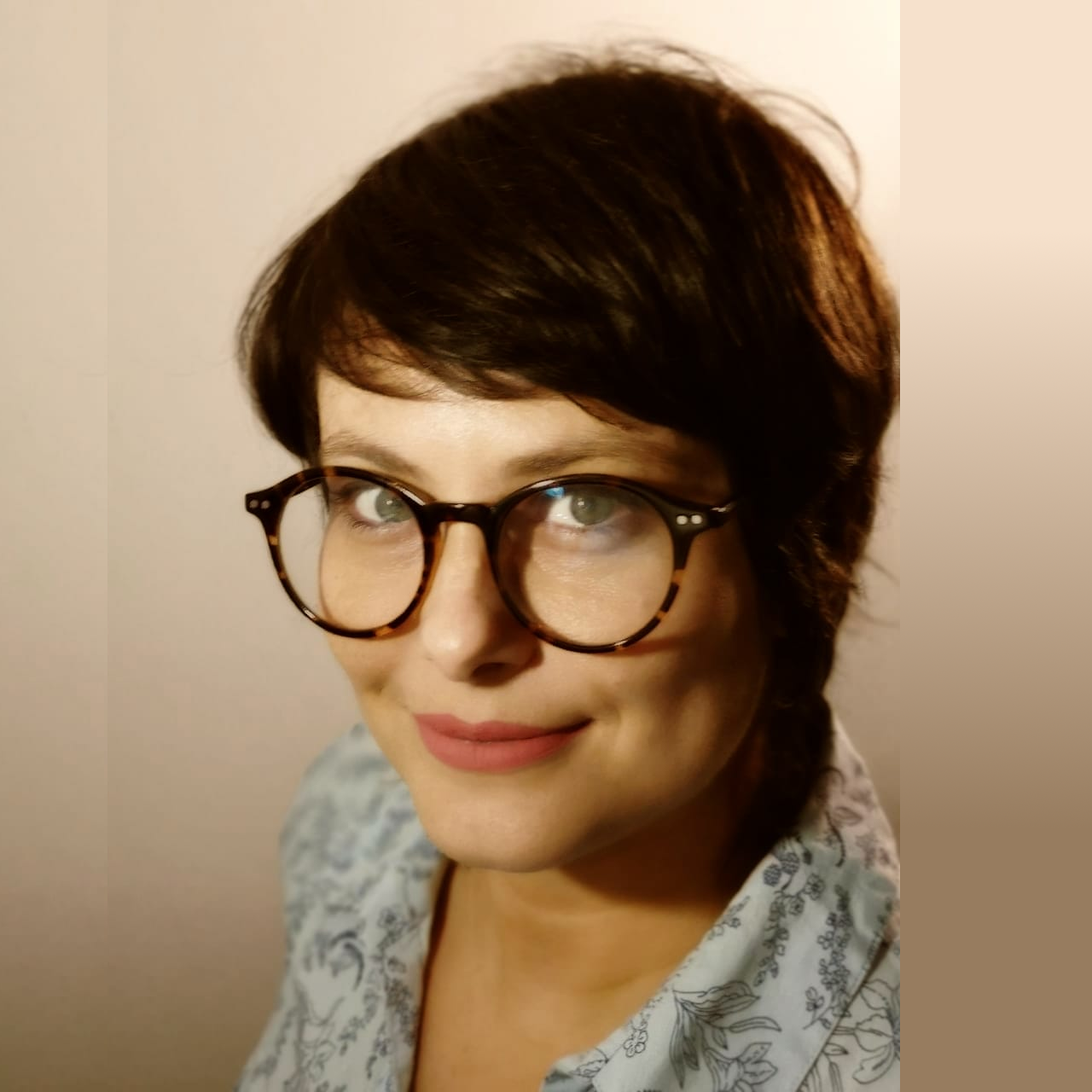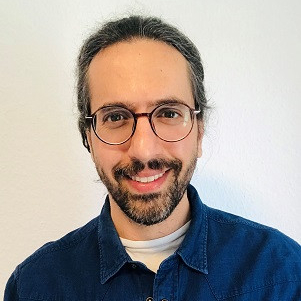“We make the positive impact of refurbishment and reuse both visible and accountable by providing verifiable and trustworthy data. Our customers are businesses and government institutions who use this data in their environmental reports, showing that their truly care about the environment,” says Stephan Fortelny, cofounder and product manager at Usody.
Offering: Get a free Usody account for 3* months by sending an Email with subject “Free Account – proofing future #circulareconomy” to hello@usody.com *funded through EIT Raw Materials Award
David Franquesa is the CEO of Usody and co-director at eReuse, where he helps public administrations and regions with transitioning to collaborative and circular consumption of electronics. Usody is helping companies, public administrations, refurbishers & ITADs (IT Asset Dispositions) to quantify the environmental and social impact of selling or donating End-Of-Life IT assets – providing value-adding traceability services such as impact & compliance reporting to businesses.
David Franquesa is also a DAO member at The OBADA Foundation, a nonprofit multi-stakeholder group in the asset disposition sector that creates an open blockchain protocol for IT Asset Disposition.The OBADA foundation is working with ISO to develop the OBADA Standard. The DAO is implementing the standard in the form of an NFT registry for physical assets.
Stephan Fortelny is a product manager at Usody. Greatly experienced in designing digital products & services, Stephan has worked with fortune 500 companies, various startups and government institutions. Stephan previously co-founded Restart Party BCN, organizing community events to repair electronic devices in Barcelona and the surrounding area. He joined eReuse as a UX/UI Designer in 2018 and finally co-founded Usody together with David Franquesa and more cofounders.
Sign up & join our next meetup on 27 July 2022:Explore synergies with Usody cofounder Stephan Fortelny along your interests in Circular Economy Impact Reporting & Digital Product Passports
Sebastian Klemm: The Circular Economy is a development priority of the EU. Why is the recent proposal of March 30, 2022 for a “Regulation of the European Parliament and of the Council establishing a framework for the setting of ecodesign requirements for sustainable products and repealing Directive 2009/125/EC” exciting from your perspectice at Usody?
David Franquesa: Today, European consumers do not have information on repairability, durability and recyclability at the time of their purchase. As a result, consumers are buying products that may seem cheaper, when they are actually not. If they break down, they are not easily repairable – neither by us nor by specialised repairers and refurbishers – forcing consumers to discard them prematurely and buy new ones. This is bad for Europeans’ wallets, bad for the European repair economy and bad for Europe’s environmental footprint.
Usody’s purpose is to increase the durability of devices. The European Commission’s Regulation on Ecodesign for Sustainable Products only reaffirms that our purpose is aligned with the will of European consumers.
However, the rebound effects of such a directive must be anticipated as well. The purpose is to extend the durability and recyclability of products. Today, repairers and refurbishers are the ones who do this work. How will this directive affect them? – Usody has already been helping repairers and refurbishers since more than five years to create product passports for the devices they refurbish and introduce in the second hand market.
We have already done pilots to ensure that our customers – repairers, refurbishers, companies and City Councils – will be able to adapt their Digital Product Passports to the framework established at European level. – What otherwise could be a barrier to entry for refurbishers, becomes a competitive advantage for our clients.
European Commission’s Ecodesign Requirements for Sustainable Products, p. 53, Article 7. 2. (b) (ii) information for consumers and other end-users on how to install, use, maintain and repair the product in order to minimise its impact on the environment and to ensure optimum durability, as well as on how to return or dispose of the product at end-of-life, (iii) information for treatment facilities on disassembly, recycling, or disposal at end-of-life.
European Commission’s Ecodesign Requirements for Sustainable Products, p. 55, Article 8. 2. (f) the actors that shall have access to information in the product passport and to what information they shall have access, including customers, end-users, manufacturers, importers and distributors, dealers, repairers, remanufacturers, recyclers, competent national authorities, public interest organisations and the Commission, or any organisation acting on their behalf;
Sebastian Klemm: How does Usody’s Digital Product Passport work in a nutshell?
David Franquesa: A Digital Product Passport stores key data to improve traceability of products and encourages sustainability by standardizing information on a product’s reusability, reparability and upgradability.
The Digital Product Passports that we implement – based on open source tools – covers two needs of our customers:
- On the one hand, the Digital Product Passport informs suppliers of second hand computers with a detailed report of the traceability of the product and its created impact in the circular economy – including i.a. the destination of reuse, the final waste manager who has made the recycling, the CO2 saved, the extended life time and more.
- On the other hand, second-hand consumers or resellers receive detailed information on the refurbishment process, benchmarks and quality tests. That ensures them to safeguard their quality chain and increase the confidence of their customers. All of this results in increased sales.
Changes made to products in the refurbishment process – like technical upgrades – are reflected in our Digital Product Passport as well as product information obtained from the manufacturer’s original product passport.

Sebastian Klemm: How can Usody’s blockchain agnostic Digital Product Passports improve the refurbishment & reuse rate of electronic devices in society?
Stephan Fortelny: We make the positive impact of refurbishment & reuse both visible and accountable by providing verifiable and trustworthy data. Our customers are businesses and government institutions who use this data in their environmental reports, showing that their truly care about the environment.
David Franquesa: At Usody we already provide consumers with reliable data on the quality and durability of digital devices such as laptops, desktops and mobiles. At Usody, each product and part gets a unique passport, which allows to trace them and know how many years they have been in use (lifetime) and how many effective hours they have been on (lifespan).
Based on this data provided by consumers and companies in the circular economy – repairers, refurbishers, resellers, recyclers – Usody ranks durability and repairability by brand and model.
It is key to allow the verifiability of these rankings and to guarantee the immutability of the data. At Usody we make this possible by leveraging blockchain technologies.
Sebastian Klemm: What is the relevance of compliance of your open source software products with Obada.io, eReuse.org and the European Blockchain Service Infrastructure for Usody customers?
Stephan Fortelny: Usody customers benefit, because provided impact data becomes more accurate and trustworthy. Today, a variety of software systems is already used for tracing devices. Usody’s compliance with international standards enables us to support multiple systems and therefore enable tracing devices throughout the reverse supply chain while protecting business privacy.
David Franquesa: At Usody we want traceability data (traces) to belong to the citizens. That is why we act in two ways:
- The trace must follow a common or standard protocol language.
- The tools to generate the traces (the software) must be open-source.
Today, in the EU and the USA, there are at least two protocols for tracing electronic devices. We want, that a device traced with the eReuse.org protocol can also be traced with the Obada.io protocol.
Additionally, we want this traceability to be stored in public blockchain infrastructures such as the European Blockchain Services Infrastructure (EBSI). For that, we conduct a pilot project with EBSI and the companies that are developing it.

Sebastian Klemm: To date, reuse impacts are claimed and communicated by many stakeholders in various forms. Could you elaborate on data quality? – What is the contextual gap that you identified and which your Usody solution can bridge?
David Franquesa: Public administrations and private companies should be aware of the impact of their IT consumption model. In order to be able to measure their impact theses are the aspects that they should know: origin, destination and impact of what they consume:
- Origin: If companies buy non-circular devices (which last 2-3 years and cannot be repaired, reused and recycled), society will not be able to make progress in the circular economy.
- Destination: Companies should prevent waste generation by facilitating the reuse of they out-of-use devices.
- Impact: Businesses can not improve what they do not measure. Only if they know the origin trace and the destination trace they will be able to measure the full life cycle impact.
Stephan Fortelny: Data quality is becoming increasingly important. Life cycle assessment (LCA) and CSR methodologies need to become more accurate and transparent to gain trust.
Currently, LCA is based on industry average values. Actual impact of reuse and refurbishment may differ dramatically. Usody provides data on actual usage during reuse and therefore provides trust among all stakeholders.
Sebastian Klemm: Your applications have been awarded with Good Practice – through Interreg Europe, the Circular Cities Award – by the Hans Sauer Foundation as well as an awarded solution in the DLT4EU social accelerator. In 2021, Usody also won the EIT Raw Materials Circular Societies Price. What project are you rolling out as a result? What do you offer companies and public administrations?
David Franquesa: At Usody we provide our customers with a traceability solution in order to measure and account for their digital devices’ impacts. Not only does this help our customers to reduce their IT’s total cost of ownership – meaning the purchase price of an IT assets plus their costs of operation – it further benefits societies and the planet.
We offer a Software-as-a-Service inventory management system with impact accounting to our customers. It is a plug & play solution that inventories, tests and scores all their devices. This way, we can increase internal reuse up to 50%. For external reuse, our solution facilitates donation or reselling to businesses – resellers, refurbishers and recyclers – that operate with Usody software in order to report their circular economy impact.
Only if companies and public administrations trace what they consume will they be able to account that impact on their balance. The effort is worthwhile. For example, the reuse of a laptop can have a cost savings of €300 and environmental savings of 300 KG CO Eq.

Sebastian Klemm: Usody also provides a digital device inventory system that follows devices and parts along their life-cycle, able to aggregating device information across projects in the eReuse ecosystem. What insights does your inventory system create? How can this effectively impact e.g. companies and public administration’s sustainable procurement?
David Franquesa: Do we consumers own our data or the data that our devices generate? For instance, the European approach is that consumers should own the data and decide with whom to share it, China’s approach is that the data should be in the hands of the government, and USA’s approach is that the data should belong to private enterprises. Worldwide altogether, however, we face the challenge of achieving holistic sustainability and a circular economy.
We will only achieve a circular economy, if the electronic devices we buy are repairable, upgradeable, reusable, and recyclable. We therefore need to make better decisions, and we need to have corresponding data to understand how decisions were made.
At Usody we have created an infrastructure to generate, share and investigate the durability of devices and the recoverability of the contained raw materials. Businesses and consumers can share anonymized raw data or data signatures to not discloses privacy while still enabling accountability.
Our first results are data sets in creative commons, shared with research institutions. We are using these data sets to identify the lifespan (years in use) and lifetime (hours of use) of models. And though can not yet benchmark models, we can already measure durability with confidence. The relevant data is shared anonymously by consent of users and companies, which allows algorithms to be created – open source – to improve decision-making. In return, data providers are rewarded by the data they share.
Offering: Get a free Usody account for 3* months by sending an Email with subject “Free Account – proofing future #circulareconomy” to hello@usody.com *funded through EIT Raw Materials Award
Sign up & join our next meetup on 27 July 2022:Explore synergies with Usody cofounder Stephan Fortelny along your interests in Circular Economy Impact Reporting & Digital Product Passports
Contact David Franquesa and Stephan Fortelny
Visit the Usody website






